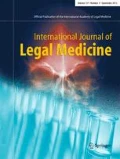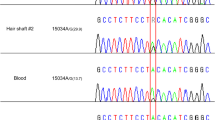Abstract
Length heteroplasmy of the homopolymeric cytosine stretch in the hypervariable region II of the mitochondrial D-loop was investigated in blood, buccal cells and hair shafts of monozygotic triplets. The proportions of length heteroplasmy were determined by cloning and sequencing of multiple independent clones. Blood and buccal cells showed an accumulation of molecules with one and two insertions of cytosine residues in relation to the Cambridge Reference Sequence (CRS). The results did not show statistically significant differences between blood and buccal cells of one and the same individual and also not between the three monozygotic brothers. In the hair samples a loss of cytosine residues was established in all three monozygotic individuals compared to blood and buccal cells, suggesting that this must be a regular process. Furthermore, the hair shaft samples showed significant differences between the frequencies of 7, 8 or 9 Cs in the poly C region comparing the three individuals (p<0.008) and in addition there were highly significant differences (p<0.0001) when comparing the results for six different hairs of each individual separately. From these results it can be assumed that besides a common genetic bottleneck during embryonic development, a post-embryonic bottleneck seems to exist in each hair follicle.
Similar content being viewed by others
References
Alonso A, Salas A, Albarran C et al. (2002) Results of the 1999–2000 collaborative exercise and proficiency testing program on mitochondrial DNA of the GEP-ISFG: an inter-laboratory study of the observed variability in the heteroplasmy level of hair from the same donor. Forensic Sci Int 125:1–7
Anderson S, Bankier AT, Barrell BG et al. (1981) Sequence and organisation of the human mitochondrial genome. Nature 290:457–464
Bendall KE, Sykes BC (1995) Length heteroplasmy in the first hypervariable segment of the human mtDNA control region. Am J Hum Genet 57:248–256
Bendall KE, Macaulay VA, Baker JR, Sykes BC (1996) Heteroplasmic point mutations in the human mtDNA control region. Am J Hum Genet 59:1276–1287
Bendall KE, Macaulay VA, Sykes BC (1997) Variable levels of a heteroplasmic point mutation in individual hair roots. Am J Hum Genet 61:1303–1308
Calloway CD, Reynolds RL, Herrin GL Jr, Anderson WW (2000) The frequency of heteroplasmy in the HVII region differs across tissue types and increases with age. Am J Hum Genet 66:1384–1397
Carracedo A, Bär W, Lincoln P et al. (2000) DNA Commission of the International Society for Forensic Genetics: guidelines for mitochondrial DNA typing. Forensic Sci Int 110:79–85
Cortopassi GA, Wong A (1999) Mitochondria in organismal aging and degeneration. Biochim Biophys Acta 1410:183–193
Harman D (1972) The biologic clock: the mitochondria? J Am Geriatr Soc 4:145–147
Hauswirth WW, Clayton DA (1985) Length heterogeneity of a conserved displacement-loop sequence in human mitochondrial DNA. Nucleic Acids Res 13:8093–8104
Hauswirth WW, Laipis PJ (1982) Mitochondrial DNA polymorphism in a maternal lineage of Holstein cows. Proc Natl Acad Sci U S A 79:4686–4690
Hauswirth WW, Van de Walle MJ, Laipis PJ, Olivo PD (1984) Heterogeneous mitochondrial DNA D-loop sequences in bovine tissue. Cell 37:1001–1007
Hellmann A, Rohleder U, Schmitter H, Wittig M (2001) STR typing of human telogen hairs—a new approach. Int J Legal Med 114:269–273
Holland MM, Parsons TJ (1999) Mitochondrial DNA sequence analysis—validation and use for forensic casework. Forensic Sci Rev 11:21–50
Holland MM, Fisher DL, Roby RK, Ruderman J, Bryson C, Weedn VW (1995) Mitochondrial DNA sequence analysis of human remains. Crime Lab Digest 22:109–115
Ivanov PL, Wadhams MJ, Roby RK, Holland MM, Weedn VW, Parsons TJ (1996) Mitochondrial DNA sequence heteroplasmy in the Grand Duke of Russia Georgij Romanov establishes the authenticity of the remains of Tsar Nicholas II. Nat Genet 12:417–420
Lindner G, Botchkarev VA, Botchkareva NV, Ling G, Van der Veen C, Paus R (1997) Analysis of apoptosis during hair follicle regression (catagen). Am J Pathol 151:1601–1617
Lutz S, Weisser HJ, Heizmann J, Pollak S (2000) Mitochondrial heteroplasmy among maternally related individuals. Int J Legal Med 113:155–161
Marchington DR, Hartshorne GM, Barlow D, Poulton J (1997) Homopolymeric tract heteroplasmy in mtDNA from tissues and single oocytes: support for a genetic bottleneck. Am J Hum Genet 60:408–416
Parson W, Parsons TJ, Scheithauer R, Holland MM (1998) Population data for 101 Austrian Caucasian mitochondrial DNA d-loop sequences: application of mtDNA sequence analysis to a forensic case. Int J Legal Med 111:124–132
Paus R, Cotsarelis G (1999) The biology of hair follicles. N Engl J Med 341:491–497
Pfeiffer H, Brinkmann B, Hühne J, Rolf B, Morris AA, Steighner R, Holland MM, Forster P (1999) Expanding the forensic German mitochondrial DNA control region database: genetic diversity as a function of sample size and microgeography. Int J Legal Med 112:291–298
Stewart JEB, Fisher CL, Aagaard PJ et al. (2001) Length variation in HV2 of the human mitochondrial DNA control region. J Forensic Sci 46:862–870
Sullivan KM, Alliston-Greiner R, Archampong FIA, Piercy R, Tully G, Gill P, Lloyd-Davies C (1996) A single difference in mtDNA control region sequence observed between hair shaft and reference samples from a single donor. Proceedings from the Seventh International Symposium on Human Identification. Promega Corporation, Madison, pp 126–130
Walsh PS, Metzger DA, Higuchi R (1991) Chelex-100 as a medium for simple extraction of DNA for PCR-based typing from forensic material. Biotechniques 10:506–513
Wilson MR, Polanskey D, Replogle J, DiZinno JA, Budowle B (1997) A family exhibiting heteroplasmy in the human mitochondrial DNA control region reveals both somatic mosaicism and pronounced segregation of mitotypes. Hum Genet 100:167–171
Author information
Authors and Affiliations
Corresponding author
Rights and permissions
About this article
Cite this article
Pfeiffer, H., Lutz-Bonengel, S., Pollak, S. et al. Mitochondrial DNA control region diversity in hairs and body fluids of monozygotic triplets. Int J Legal Med 118, 71–74 (2004). https://doi.org/10.1007/s00414-003-0409-0
Received:
Accepted:
Published:
Issue Date:
DOI: https://doi.org/10.1007/s00414-003-0409-0




